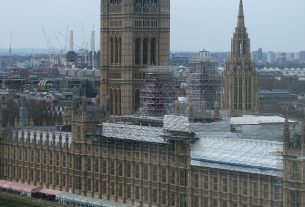The government’s long awaited Energy Security Strategy for the UK has finally been published – and immediately condemned for ignoring energy efficiencies and offering no help to deal with rising prices now.
Despite energy efficiencies – such as insulating homes – being hailed as “a silver bullet” for the UK’s energy conundrum, the government’s strategy omits any schemes that would cut demand, save money and create jobs.
Energy efficiency would help the UK tackle soaring prices, meet its zero-emissions targets and reduce reliance on imported oil and gas. It would also create a new sector and thousands of jobs. More importantly, energy efficiency would drastically cut household bills by virtue of the simple fact homes would be more energy efficient, thereby cutting demand.
But instead of seizing a golden opportunity, Boris Johnson’s plan emphasises “energy independence and security” over efficiency. Instead of investing in making the country more energy efficient, the prime minister is spending billions on new nuclear power projects (with up to eight new plants proposed); ramping up oil and gas drilling in the North Sea; and, expanding renewable (but not cheap on-shore wind) – to fuel the UK’s energy future.
Energy security strategy is economically and environmentally iterate
Green MP Caroline Lucas dismissed the government’s plan as “economically and environmentally illiterate” in today’s (April 7) Independent where she outlines the impact simple energy efficiencies can have.
The UK has “the leakiest housing stock in Europe” writes Lucas, yet “simple loft, wall and draught proofing insulation could cut household gas demand by 20%, which is a saving three times greater than opening six new oil and gas fields.”
It’s also highly popular among voters with a poll released yesterday showing 84% think insulation is “very or fairly important” in helping the UK curb its use of gas from Russia.
Making it only more baffling as to why a populist like Johnson is ignoring such an obvious remedy to the problem of supplying the UK’s energy demand.
But then he’s an “unrepentant and inveterate liar”. And a right-wing pseudo-populist. Because for Johnson, big government spending on big public projects invariably means an opportunity for big profits for a select number of select individuals and companies, rather than on improving life for the wider populace.
Because the emphasis of the energy security strategy is all about big projects and bigger plans to generate more power – and bigger profits – rather than anything that will help cut demand.
Johnson said “we need a flow of energy that is affordable, clean and above all secure” in order to lower energy prices. In the foreword of the strategy, he states: “We need a power supply that’s made in Britain, for Britain – and that’s what this plan is all about.”
It’s about supply and not at all about efficiency. Even though, as Lucas says, we could provide three times our current Russian gas imports by 2025, simply by making our homes, buildings and industry energy efficient
Yet Johnson still claims it is his plan that will guard Britain from being “subject to blackmail” from the likes of Vladimr Putin.
He even voiced, “nuclear is coming home”. Not only is nuclear waste among the most toxic substances on the planet and very, very expensive to store safely, it is also very slow. The new nuclear plants won’t be ready for a decade and even besides that, nuclear power “meets no technical or operational need that low-carbon competitors cannot meet better, cheaper and faster,” according to the 2019 World Nuclear Industry Status Report (WNISR). (And in the time since, renewable have become even cheaper and more efficient still.)
So why not put the many, many billions needed to build eight new nuclear stations towards making Britain’s buildings more energy efficient instead?
Energy efficiency is the fabled silver bullet
The glaring absence of any plans to increase energy efficiency and cut demand has been roundly rebuked by industry figures.
Boss of energy provider Eon UK, Michael Lewis is scathing in his assessment of the government’s plan and said: “There is little in today’s announcement that will deliver a solution this decade, let alone this year.”
Lewis calls energy efficiency “the fabled silver bullet” yet still the government has ignored any measures for it. Energy efficiency “cuts bills and carbon emissions today – It creates jobs and reduces reliance on foreign gas,” said Lewis.
“By abandoning any extra commitment to helping people to improve their homes, today’s announcement condemns thousands more customers to living in cold and draughty homes, wasting energy and paying more than they need to for their heating,” Lewis added.
‘Very little to quickly help people with soaring energy bills’
To help with rising prices, the government announced a £200 loan – to be paid back over five years – which it calls a “discount” on household energy bills. There is also a £150 council tax discount for homes in bands A-D. Annual energy prices for the average household rose £700 at the start of April. Another big increase will follow in October.
The energy security strategy will not help with those rises, as Andrew Sissions from the UK’s Innovation Agency pointed out. Sissions said the plan “is heavy on long term ambition and light on quicker, greener wins like clean heat and onshore wind.
“Crucially, there is very little in this plan that will quickly help people with soaring energy bills.”
For Martin Young, a senior utilities analyst at Investec bank, the lack of any energy saving schemes for households shows “a clear lack of ambition” by Johnson’s government.
In February, Investec predicted average energy bills to hit £3,238 per year when the price cap is adjusted in October. The “devastating” impact of the rises – from an average £1,288 at the end of March, to more than £3,000 in the autumn – will affect 22 million households and Young said it will “plunge many people into fuel poverty”.
Former energy minister Charles Hendry called the lack of any energy efficiency measures in the strategy – beyond establishing an advice website – a “major misjudgement”. It will “force large numbers of very vulnerable people to be cold next winter when they need not be.”
The Guardian calls Johnson’s plan “a huge missed opportunity” with the government gambling “big on nuclear, hydrogen, oil and gas while passing over energy saving measures.”
Even the government itself admits the strategy has nothing for people already struggling to deal with the highest spike in energy prices in history, made even worse by knowing another huge rise is just six months away. Business secretary Kwasi Kwarteng told Sky News it is “right” to call the strategy “more of medium term three, four, five year answer”.
He told the BBC the government’s energy security strategy “won’t address” people’s energy bills in the immediate term, saying: “It won’t reduce bills next week but it will create a system that will reduce them in the longer term.”
For struggling households that longer term cannot come quick enough. For the planet, there may not even be one.




